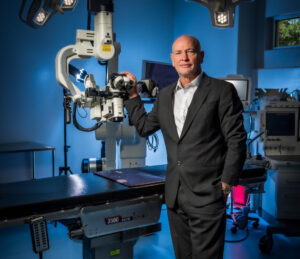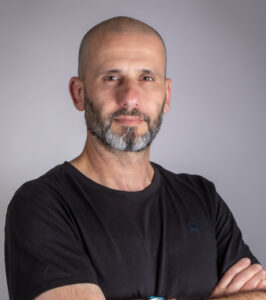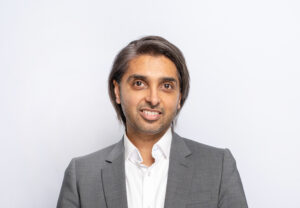From diagnosis to treatment, AI is revolutionising the way medical professionals approach patient care.
By analysing vast amounts of data and offering invaluable insights, AI is helping doctors make more accurate diagnoses, develop personalised treatment plans, and enhance patient outcomes.
To understand the impact of AI on healthcare, we spoke to the experts.
Here’s what they had to say…
Our Experts
- Eliran Malki, CEO at Belong.Life
- Dr Milad Shadrooh, Also Known As The Singing Dentist
- Kieran Sheridan, Co-Founder at GulfPhysio.com
- Dr. Hamdan Abdullah Hamed MBChB, Co-Founder at PowerYourCurls.com
- Dr. Robert Masson, MD, CEO at eXpanded eXistence
- Jo Aggarwal, CEO at Wysa
- Abbas Kanani, Pharmacist at Chemist Click Online Pharmacy
- Paul Christie, CEO and Co-Founder at Tachmed
- Ayesha Iqbal, IEEE Senior Member and Engineering Trainer at The Advanced Manufacturing Training Centre
- Ian Soh, Founder at BTRU AI
- Eran Eshed, CEO and Co-Founder at Fairtility
- John Klepper, CEO and Co-Founder at PIPRA
- Asam Malik, Partner at Mazars
- Justene Ewing, Vice President of Health and Care at CGI
- Graham Sharp, MD at Stanley
Eliran Malki, CEO at Belong.Life

“AI is revolutionising the healthcare industry in unimaginable ways. It enables healthcare providers to analyse vast amounts of data faster and more accurately than ever, leading to more accurate diagnoses, personalised treatment plans, and improved patient outcomes.
“In the next five years, I believe AI in healthcare will continue to evolve, becoming even more sophisticated – it will be used everywhere and it’s a must have now. AI-powered virtual assistants, chatbots and predictive analytics tools will be widely implemented, helping healthcare providers make informed decisions. This technology has the potential to lower costs, burdens, and bureaucracy in healthcare, making it more efficient and accessible. However, the widespread implementation of AI in healthcare also brings ethical challenges and risk. There is a risk that AI algorithms will perpetuate biases, or incorrect results, leading to disparities in care. Additionally, there are concerns around privacy and security of patient data and the potential for AI to replace human healthcare providers.
“It is clear that patient-centered AI-powered virtual assistants are a transformative force in healthcare, changing the way services are delivered and consumed. It will make healthcare more accessible, affordable, and efficient for everyone.”
Dr Milad Shadrooh, Also Known As The Singing Dentist

“The Dental Industry is constantly evolving and it doesn’t stop at AI – AI is being used for dental X-rays that can diagnose cavities, tooth decay and gum disease so even small changes on X-rays will not be missed and you can create consistent diagnosis.
“There are AI-driven tooth monitoring softwares that work especially well when patients are having clear aligner treatments. You take photos with your phone and the AI reads the images and can tell you if the teeth have moved correctly and if you’re ready to change to the next aligner. This virtual monitoring is great to reduce visits to the dentist and can also pick up fit and progression issues more quickly so will save time and money in the long run.
“Planning for aligner treatment can also be made easier by using AI – when you are having aligners to move teeth, AI is now being used to help plan these movements and create the treatment plan. Experienced dentists are still required to check the plans but this greatly reduces time and manpower when you are looking at large volume planning.
“As well as the in-clinic hours that Dentists commit to, there’s an awful lot of paperwork required in the background. AI software that helps to write notes is extremely valuable – writing good clinical notes is essential and AI is helping dentists to document things correctly and effectively, and in a timely manner.”
Kieran Sheridan, Co-Founder at GulfPhysio.com

“Currently some companies are developing AI algorithms for physical assessments, mainly to assist in the diagnosis of range of motion (ROM) issues. Through a simple video submission, elderly patients can capture their movements and perform specific exercises while AI algorithms analyse the range of motion and identify patterns. This would then be mapped against a standard range of motion that other elderly people would have.
“This would then help to provide accurate assessments and personalised treatment plans.
“These would include simple exercises designed to increase joint mobility and strength. Patients can monitor their ROM progress weekly based off regular video submissions and exercise diaries.”
For any questions, comments or features, please contact us directly.

Dr. Hamdan Abdullah Hamed MBChB, Co-Founder at PowerYourCurls.com

“The integration of AI into dermatology holds immense potential for improving patient care and treatment outcomes. AI algorithms can assist dermatologists in diagnosing skin conditions by analysing medical images, such as dermoscopic or histopathologic images, and providing valuable insights and potential diagnoses. This can aid in more accurate and timely diagnoses, ensuring appropriate treatment plans are initiated promptly.
“Currently AI is already being used as an aid to detect anomalies in X-Rays and MRI scans. In dermatology, AI can help monitor treatment progress by analysing patient data, such as skin response to therapy, and providing recommendations for adjustments or modifications to optimise results.
“Finally, AI can contribute to advancements in skin cancer detection and screening, utilising image analysis and machine learning to identify suspicious lesions for further evaluation. However, I feel that this is not currently viable as of yet.”
Dr. Robert Masson, MD, CEO at eXpanded eXistence

“The healthcare industry is ripe with opportunity in the AI space. While there is significant caution given some of the fears of autonomous AI, the leaders in the space are using closed api applications to navigate modelled and specific algorithms for relevant problems.
“For instance at eXpanded eXistence, Inc. (EXeX) we are focused on creating procedure specific organisational learning for surgery logistics, commodity use and performance while enhancing team work flow.
“In the clinical arena, there are numerous apps that have already been released that streamline the bureaucracy of management, insurance interactions and financial management of clinical services.
“It is an exciting time.”
Jo Aggarwal, CEO at Wysa

“Conversational AI creates an anonymous, safe space to work through worries and stressors, preventing them from escalating in severity and towards illness. Conversational AI as the first step of care offers perhaps the only equitable and systemic solution to the global mental health crisis. Research shows that people are more likely to open up to AI than humans, and that AI-guided mental health support and health coaching can create a bond and has efficacy comparable to that of human therapists. Looking beyond the hype of ChatGPT, conversational AI technologies can help us solve some of the world’s most pressing health crises.
“A key part of Wysa’s appeal stems from its ability to use natural language AI and create an empathetic interface that is highly engaging and effective for users while retaining guardrails that make the platform safe, private, and clinically validated.
At Wysa, we limited the use of AI to natural language understanding and personalisation within a clinically approved algorithmic framework. Generative capabilities where used are adjunctive to this framework and are explainable, testable, and clinically approved. Wysa’s framework to deliver responses to users is a rule-based system created by clinicians that leverages AI to converse using natural language.
“For instance, AI can help determine if a user’s statement contains suicidal ideation, but the response to that statement which includes an escalation path to helplines and the technique for working on a safety plan is driven by an explainable, auditable, and clinically approved algorithm. The usage of AI in this manner can be validated and tested for safety, something that would not be possible with a generative AI response, no matter how appropriate it was.
“With Wysa, we have already seen its potential in addressing mental health and chronic conditions. Adding AI as the first step in the care continuum can help bridge the shortage of qualified professionals, and barriers to access related to stigma, cost, and availability. AI can build a therapeutic alliance and create equitable access to support at scale.”
For any questions, comments or features, please contact us directly.

Abbas Kanani, Pharmacist at Chemist Click Online Pharmacy

“Although AI has the potential to positively contribute to streamlining workflows and flag potential issues in the health sector, it can be limited and therefore not a total replacement for patient care. It is very early days and unless there are programs created with the input of health professionals globally, which could take many years, AI takes on more of a support role due to its limits. The analysis of patient data, including medical records, genetic information and lifestyle factors to predict disease outcomes and responses to different medications can be used to personalise treatment plans and improve medication efficacy.
“AI may also be useful for providing dosage recommendations, flag potential drug interactions or allergies and suggesting alternative medications if needed. Automation to verify prescriptions could also help pharmacists to focus on patient care rather than administrative tasks. It can predict when specific medications need to be restocked, which helps to reduce wastage and ensure availability for patients.
“AI has the potential to support remote dispensing and counselling services, allowing pharmacists to remotely assist patients in underserved areas or during emergencies. Industry wide, AI could help to accelerate the drug discovery process, whilst reducing costs because of its capability to analyse large volumes of biological and chemical data.”
Paul Christie, CEO and Co-Founder at Tachmed

“AI-powered technology stands to have an immense impact on how patients engage with clinicians and vice versa, reducing waiting times and enabling faster diagnosis of a range of health conditions. Given the pressure on healthcare systems, anything that can lead to more efficient ways of working should be seen as a real opportunity.
“The biggest consideration for the healthcare industry has to be around trust, and rightfully so. It’s not difficult to imagine the damage that could be done should patient data get into the hands of those seeking to cause harm on communities or entire populations. Patients will only consent to share their data if this trust is secure.
“At Tachmed we are focused on bringing frontline diagnostics into people’s homes, through the development of smart devices. These at-home testing devices will act as the main point where information comes in. The results data can then be automatically processed and shared securely with relevant parties via machine learning and AI technology. Essentially, the technology is providing a person with data about the state of their health in real-time. The AI is then making decisions about it, calculating what behavioural changes or therapeutics are required to improve that person’s health. If a prescription is required, the process can be automated. Essentially, the patient is getting a consultation with a doctor via a virtual front door.”
Ayesha Iqbal, IEEE Senior Member and Engineering Trainer at The Advanced Manufacturing Training Centre

“Recently, AI has evolved with numerous applications across almost all disciplines of life – and the healthcare sector is no different. The emergence of AI in healthcare has completely reshaped the way we diagnose, treat and monitor patients. Applications of AI in healthcare include finding new links between genetic codes, performing robot-assisted surgeries, improving medical imaging methods, automating administrative tasks, personalising treatment options, producing more accurate diagnoses and treatment plans, enhancing preventive care and quality of life, predicting and tracking the spread of infectious diseases, and helping combat epidemics and pandemics.
“A 2019 study reported in The Lancet Oncology showed the accuracy of an AI system in diagnosing prostate cancer in tissue samples. In addition, a trial at Aberdeen Royal Infirmary has been exploring whether AI can assist radiologists in reviewing thousands of mammograms a year. Despite numerous applications being considered promising, the adoption of AI in healthcare is facing some challenges, such as complexity of AI systems, lack of technology awareness, lack of skilled AI workforce and regulatory guidelines, and lack of trust. Therefore, it is crucial to establish ethical guidelines and standards, ensure data privacy and security, offer trialability, and educate patients so that trust can be developed. At that point, widespread adoption of AI in healthcare can be realised.”
For any questions, comments or features, please contact us directly.

Ian Soh, Founder at BTRU AI

“AI Health search tools like, BTRU AI, is helping patients find reliable health information easier online. For far too long patients deserve better search on Google when learning more about their health. When on Google, people face advertisements, unreliable health sources and risk becoming misinformed. This tool helps to tackle these problems, take away the anxiety associated with searching online and give them the search experience they truly deserve.
“AI is helping us all in healthcare towards a time where people from all backgrounds are able to take control of their health, find reliable health information and make sense of their health, to live their healthiest and best life with the help of technology, bridging the gap between health providers and individuals. Can you imagine, regardless of background or wealth, someone who has not studied Medicine can use this piece of technology and get the best health information? This is an example of AI demonstrating how it can be a force for good for healthcare.”
Eran Eshed, CEO and Co-Founder at Fairtility

“With 1 in 6 people globally experiencing infertility, access to IVF treatment is growing. Despite advancements in the field, IVF maintains a low success rate of 30% on the first cycle. Current IVF treatments are encumbered by subjectivity in clinical decision-making and inefficient manual processes. This is augmented by a shortage of IVF professionals to provide care to the many prospective parents seeking treatment.
“Today, embryologists choose the highest quality embryos based on just a few data points with a goal of achieving pregnancy. The introduction of Time Lapse Incubators (TLI), which house developing embryos in a protected and consistent environment, offers a new opportunity for AI to impact IVF. TLIs capture the entire lifespan of developing embryos in a video feed, creating large and continuous amounts of data. AI can capture, abstract and standardise analysis of this data to optimise decision making, improve outcomes and streamline fertility care operations.
“Fairtility has developed the only transparent AI decision support tool for IVF, CHLOE EQ™, which provides an embryo quality score with explainability. CHLOE automatically provides insights on embryo biology that can support precise analysis and decision making, streamlining the embryo selection process with a clear goal of reducing time to pregnancy for prospective parents.”
John Klepper, CEO and Co-Founder at PIPRA

“AI has already and continues to revolutionise the healthcare industry, transforming the way we approach patient care and medical research. At PIPRA, we believe that the power of AI lies in its ability to augment human expertise, enhancing our capabilities and improving healthcare outcomes through innovation.
“AI-driven algorithms and devices are shifting paradigms, enabling early disease detection and accurate predictions, providing clinicians with insights and recommendations for personalised treatments. AI’s ability to predict disease progression with precision empowers clinicians to make informed decisions, optimise treatment plans, and ensure timely interventions, leading to better patient outcomes. Furthermore, AI enables personalised healthcare delivery by tailoring treatments to individuals’ unique characteristics, resulting in higher efficacy and fewer adverse effects.
“However, we must tread carefully on this transformative path. Ethical considerations and privacy concerns should be at the forefront of AI integration in healthcare. That said, healthcare systems need to ensure that transparency and responsible data use are maintained.
“As CEO and Co-Founder of PIPRA, I am committed to harnessing the power of AI to help reshape the healthcare landscape. By fostering collaboration, encouraging innovation, and upholding ethical standards, we can unlock the full potential of AI to improve the health and well-being of individuals worldwide.”
For any questions, comments or features, please contact us directly.

Asam Malik, Partner at Mazars

“Over the past twelve months AI has rapidly transformed the accessibility of datasets, which is profoundly shaping research and development in life sciences. The ability of AI to look for patterns and analyse impressive amounts of data is crucial for R&D in life sciences – those who do not harness this potential are put at risk of being left behind.
“For this sector, the main benefit is the ability to navigate and analyse sets of seemingly unrelated data. Complimented further by the accessibility of AI, given you do not need to necessarily put in huge amounts of investments, in comparison to the past. However, the extent of this accessibility also impedes the extent AI can be positively viewed to impact life sciences. In the use of commercially available AI tools, like ChatGPT, the data goes into a public forum. This increases the risk of potential data breaches, which is extremely worrying given the confidential client data utilised in life sciences.
“With such open data forums being accessed and leveraged by many other third parties, an “AI strategy” is essential. One involving individual companies using their own private AI closed from public domain, or current legislation being updated, would help overcome these risks.”
Justene Ewing, Vice President of Health and Care at CGI

“The transformative potential for AI in the healthcare sector is unparalleled, especially considering mounting pressures and complex challenges. With financial constraints, workforce shortages, changing demographics, and rapid tech advancements, AI has the power to profoundly impact healthcare users, providers, funders, and policymakers.
“Patient monitoring and management have already been revolutionised by AI-powered systems. Remote monitoring and telemedicine solutions enable care delivery outside traditional healthcare settings, bridging geographical barriers and expanding access to medical advice, consultations, and even remote surgeries. Real-time health data collected through wearable devices, and smart sensor facilitates enable remote vital sign monitoring and early detection of potential health events. Bringing us closer to hybrid healthcare that reduces reliance on physical care environments.
“AI leverages data to identify patterns, predict treatment responses, and develop personalised medicine treatment plans, all of which can enhance treatment effectiveness.
“Administrative tasks have also benefited from AI automation. Chatbots and virtual assistants handle routine inquiries, appointment scheduling, and basic medical advice 24/7, alongside reducing paperwork. All of which improve patient access to information while alleviating the burden on medical professionals.
“It is essential to ensure that data privacy, algorithm biases, and ethical considerations are assessed to ensure the responsible use of AI in healthcare.”
Graham Sharp, MD at Stanley

“The Health and Safety sector in the UK is starting to see ground-breaking change with the introduction of AI solutions to help cut workplace injuries. These take the form of wearable devices that can monitor movement and help prevent debilitating muscular disorders (MSDs) which were responsible for a total of 27% of all work-related ill health cases in the UK in 2021/22 according to the Health and Safety Executive.
“Stanley is currently collaborating with AI technology specialists Modjoul, WearHealth and Ansell, who all provide wearable workplace AI solutions to help improve workers’ safety and wellbeing, and make sure that daily tasks can be performed without injury or suffering from musculoskeletal disorders like back pain linked to repetitive movement.
“One of the key benefits of these new wearable AI technology solutions, aside from improvement of health and wellbeing, is the detailed real time data that businesses can collect, related to the workplace environment, and the tasks carried out. The technology is continuously measuring and tracking progress allowing companies to obtain granular reporting on bends, stooping, crouching, reaching, and carrying. This data is invaluable in helping the workplace to operate more efficiently and improving workplace wellbeing.”
For any questions, comments or features, please contact us directly.




